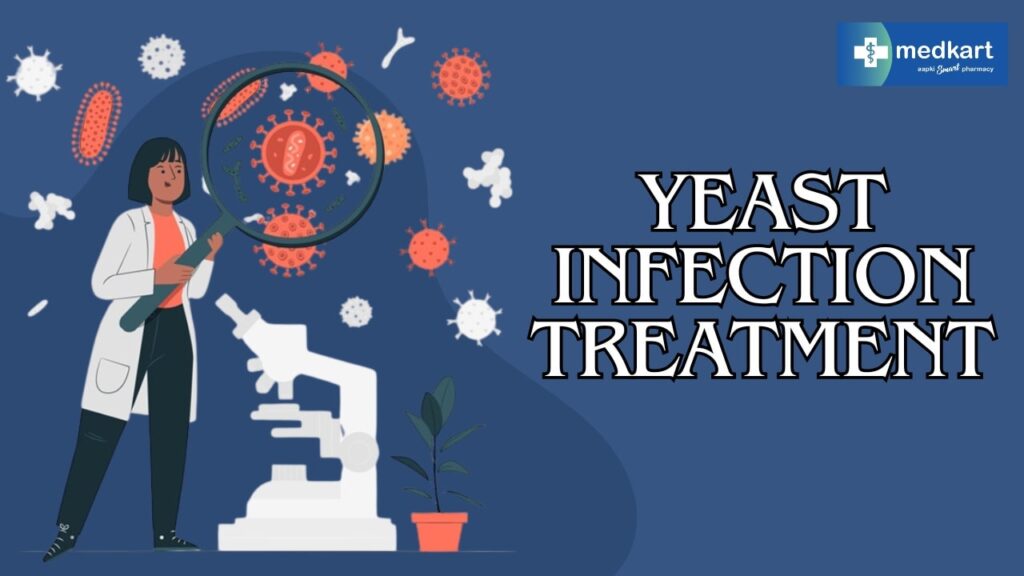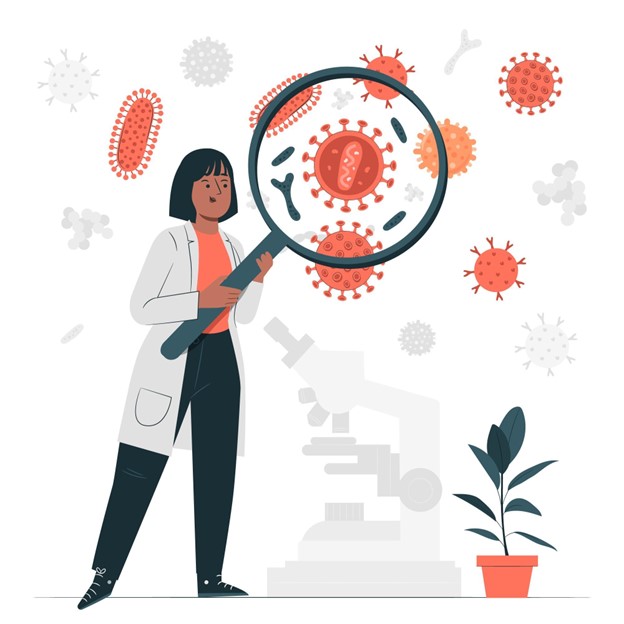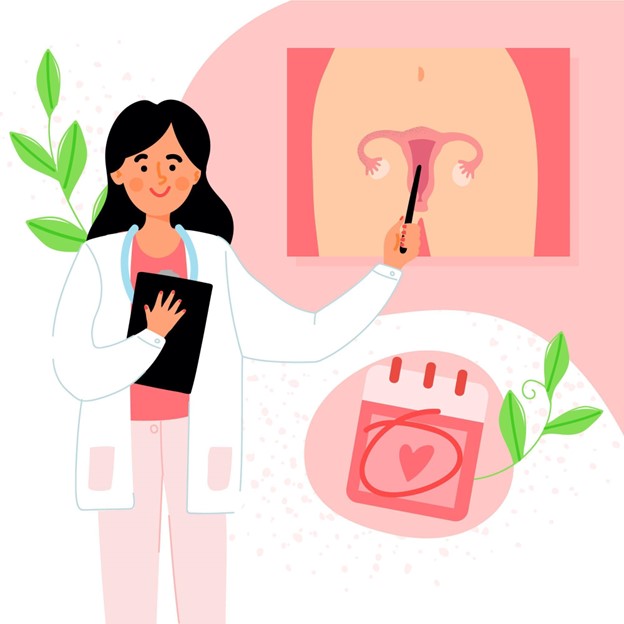Last updated on April 14th, 2025 at 11:06 am
 Yeast infection treatment typically involves over-the-counter antifungal medications, such as creams, ointments, or suppositories containing active ingredients like clotrimazole or miconazole. These products are applied directly to the affected area, offering relief from symptoms like itching, redness, and discomfort. In more severe cases or for recurrent infections, healthcare providers may prescribe oral antifungal medications like fluconazole. Additionally, incorporating probiotics into the diet, maintaining good personal hygiene, and wearing breathable cotton underwear can contribute to prevention and recovery.
Yeast infection treatment typically involves over-the-counter antifungal medications, such as creams, ointments, or suppositories containing active ingredients like clotrimazole or miconazole. These products are applied directly to the affected area, offering relief from symptoms like itching, redness, and discomfort. In more severe cases or for recurrent infections, healthcare providers may prescribe oral antifungal medications like fluconazole. Additionally, incorporating probiotics into the diet, maintaining good personal hygiene, and wearing breathable cotton underwear can contribute to prevention and recovery.
Yeast infections, caused by the overgrowth of the Candida fungus, can be a source of discomfort and frustration for many individuals. Yeast infections, also known as candidiasis, commonly affect areas like the vagina, mouth, and skin folds. Candida is a naturally occurring fungus, but factors like a weakened immune system, antibiotic use, hormonal changes, and diabetes can lead to its overgrowth, causing infections.
Recognizing Symptoms of Yeast Infection
Before delving into yeast infection treatment options, it’s essential to recognize the symptoms of yeast infections. These may include:
- Vaginal itching and soreness
- Cottage cheese-like discharge in women
- Redness and swelling
- Burning sensation during urination or intercourse
- White patches in the mouth (oral thrush)

Yeast Infection Treatment
The best types of treatment for yeast infection are mentioned below:
Over-the-Counter Antifungal Medications
For uncomplicated yeast infections, over-the-counter antifungal creams, ointments, or suppositories are often the first line of defence. Common active ingredients include clotrimazole, miconazole, and tioconazole. These medications are usually applied directly to the affected area and can provide relief within a few days.
Prescription Medications
For severe or recurrent infections, a healthcare provider may prescribe stronger antifungal medications in the form of oral pills, such as fluconazole. It’s crucial to follow the prescribed dosage and complete the entire course of medication, even if symptoms improve before the medication is finished.
Alternative Therapies
Certain alternative therapies, such as tea tree oil and coconut oil, have shown antifungal properties and may provide relief for some individuals. However, it’s essential to approach these with caution and consult with a healthcare professional before trying them.
Home Remedies for Vaginal Yeast Infection
Several home remedies and lifestyle changes may help alleviate symptoms and prevent recurrent yeast infections:
- Probiotics: Consuming probiotics, either through supplements or fermented foods like yoghurt, can help restore the balance of good bacteria in the body, potentially reducing the risk of yeast overgrowth.
- Maintaining Personal Hygiene: Keeping the genital area clean and dry can help prevent yeast infections. Avoiding scented soaps, douches, and feminine hygiene products is advisable.
- Dietary Changes: Some individuals find relief by adopting a low-sugar diet, as sugar can promote the growth of yeast. Increasing intake of fiber-rich foods and staying hydrated also supports overall health.
- Cotton Underwear: Wearing breathable cotton underwear can help reduce moisture and prevent the development of a conducive environment for yeast overgrowth.
Also, Read:
- Varicocele Treatment
- Uterine Fibroids Treatment
- Tinnitus Treatment
- How to Increase Sperm Count?
- BP Normal Range for Female
Vaginal Yeast Infection Treatment
Vaginal yeast infection treatment commonly involves the use of over-the-counter antifungal medications, such as creams or suppositories, containing active ingredients like clotrimazole, miconazole, or tioconazole. These products target the overgrowth of the Candida fungus, alleviating symptoms like itching, burning, and abnormal discharge. Applying the medication directly to the affected area provides localized relief.
In cases of persistent or recurrent infections, healthcare providers may prescribe stronger oral antifungal medications. Adopting healthy lifestyle practices, including the use of probiotics, maintaining proper hygiene, and wearing breathable cotton underwear, can complement medical treatments and contribute to the prevention of future infections.

Penis Yeast Infection Treatment
Penis yeast infection treatment typically involves the use of antifungal medications to address the overgrowth of Candida, a fungus causing the infection. Over-the-counter antifungal creams, ointments, or powders containing active ingredients like clotrimazole or miconazole can be applied topically to the affected area. Maintaining proper hygiene, including regular washing and keeping the genital area dry, is crucial for effective treatment.
In more severe cases or when the infection persists, healthcare professionals may prescribe oral antifungal medications. Individuals need to complete the entire course of prescribed treatment and refrain from sexual activity during the healing process to prevent the spread of the infection.
> Consult a Doctor and Medkart will help you Order Medicines Online
Conclusion:
Understanding yeast infections and their treatment options empowers individuals to manage their symptoms effectively. While over-the-counter medications and prescription treatments play a crucial role, adopting healthy lifestyle practices and seeking professional advice when needed are integral components of a holistic approach to yeast infection treatment.
Read: What are Generic Medicines?
FAQs On Yeast Infection Treatment
Q1. What is Yeast Infection Treatment?
Yeast infection treatment typically involves the use of over-the-counter antifungal medications, such as creams or suppositories, to address the overgrowth of the Candida fungus. In more severe cases, healthcare providers may prescribe oral antifungal medications. Lifestyle adjustments, including proper hygiene and dietary changes, can complement medical treatments for a comprehensive approach.
Q2: Can I treat a yeast infection with over-the-counter medications?
Yes, mild yeast infections can often be effectively treated with over-the-counter antifungal creams, ointments, or suppositories containing ingredients like clotrimazole or miconazole.
Q3: How long does it take for yeast infection treatments to work?
Over-the-counter treatments typically provide relief within a few days. However, prescription medications, if prescribed, may take longer, and it’s essential to complete the entire course as directed by a healthcare professional.
Q4: Are there home remedies for yeast infections?
Yes, some individuals find relief through home remedies such as probiotics, maintaining good hygiene practices, and incorporating a low-sugar diet. However, it’s advisable to consult with a healthcare provider before trying alternative therapies.
Related Links:
